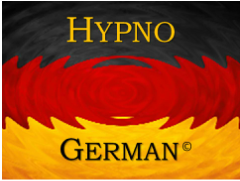HypnoGerman ...... is a leading-edge language learning system, which makes the best use of It is not some sort of hokus-pokus, like putting students to sleep and let them wake up knowing a foreign language. (Curiously enough that has been tried: it was found that subjects, who listened to foreign language material during sleep, retained much of the material. Unfortunately, they also produced the symptoms of sleep deprivation and the experiment had to be terminated.) hynotherapeutic techniques,
I have designed using hypnotherapetic techniques to teach students a language from within. It allows you ke a child, to re-explore the world and see it as they have never seen before: from the perspective of a different culture. I grew up bilingual, as we moved from Hungary to Germany when I was about three years old. I still remember the utter bewilderment I felt when I was left in a Kindergarden where everyone seemed to have gone insane. "Everyone here is speaking nonsense," I protested as my mother left me there. However, speaking two languages rapidly became to me as normal as it was to walk sometimes, and ride the bicycle another time. |
Relax.
Visualise. Don't translate. |
As a small child it took me about two month to learn another language. As an adult, it took me over then years to learn yet another (English). I grew up bilingual, as we moved from Hungary to Germany when I was about three years old. I still remember the utter bewilderment I felt when I was left in a Kindergarden where everyone seemed to have gone insane. "Everyone here is speaking nonsense," I protested as my mother left me there. However, speaking two languages rapidly became to me as normal as it was to walk sometimes, and ride the bicycle another time. As a hypnotherapist, it intrigued me and puzzled me why children learn seemingly so much faster, and while we fail as adults to learn foreign languages in effective ways. Is there a language learning machine somewhere in our minds, which turns itself off, as we grow out of childhood. After years of experimentation and study, I came to the conclusion
that the mind indeed has its own innate way to learn a language, which we can use no matter how old we are.
that the mind indeed has its own innate way to learn a language, which we can use no matter how old we are.
HypnoGerman is not some sort of hokus-pokus, like putting students into a hypnotic trance and let them wake up knowing a foreign language. It is a system to optimize your memory and language acquisition prose(Curiously enough that has been tried: it was found that subjects, who listened to foreign language material during sleep, retained much of the material. Unfortunately, they also produced the symptoms of sleep deprivation and the experiment had to be terminated.)
1. Relaxed State of Mind. It is a widely studied phenomenon today that the brain is most effective when in a relaxed state, predominantly in the Alpha-brain wave range. This is what the hypnotic state is mostly about: to get the brain into a state of relaxed and focused attention. It is not about getting into a trance or any weird, stage-like states; while you learn, you have your full awareness, but you will be chilled-out, like day-dreaming. This state of mind allows us to get back into the childhood mind-set which is free of self-criticism and performance pressure, and is fueled by curiosity.
2. Visualisation. Growing up bilingual, I was often asked which language I'm thinking in. I never could answer that question. One day I heard girl who also grew up bilingual, to answer it. She said: "I don't think in any language." It was then that I began to understand the nature ogief successful multi-lingualism. People struggle and struggle with speaking foreign languages, because their mother-tongue is always there in the background, from which they are trying to translate. That is an awfully time-consuming as well as frustrating process (every time you run into a word which you know in your first language, but not in the language you're trying to speak.) A learning system largely based on visualisation rather then translation allows for the brain to create associations based on images rather then words of your mother tongue, which allows you to bypass translation and be fluent even if you know less words in the target language.
3. Mnemonics.
